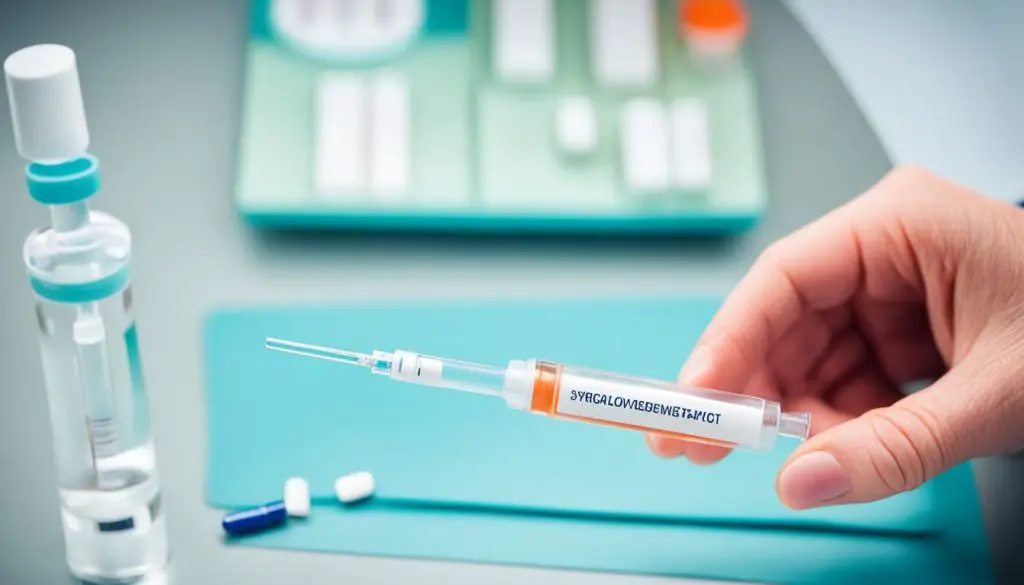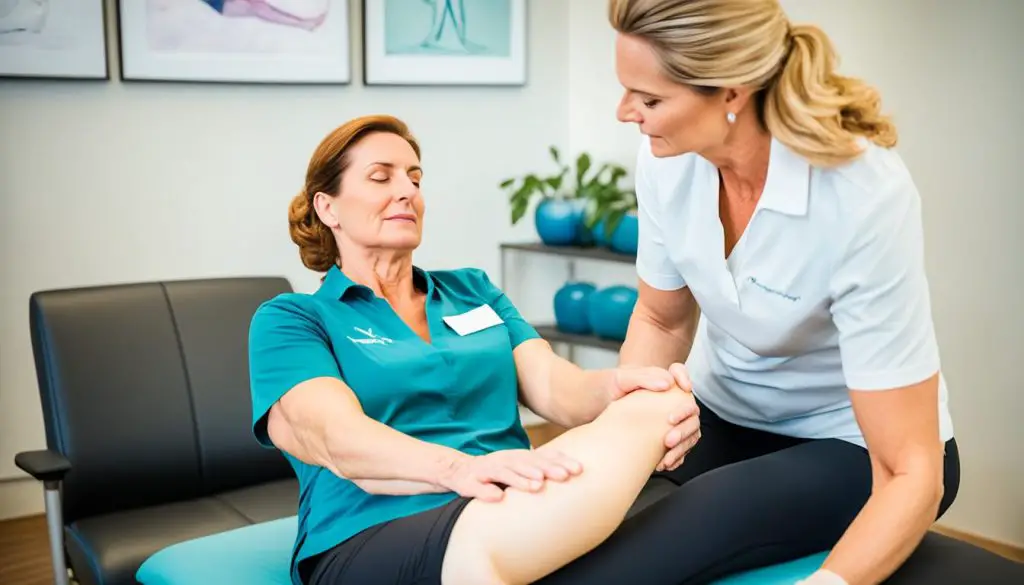Being married to a woman with endometriosis and fibromyalgia has taught me a lot. I’ve seen how it affects intimacy. The pain, discomfort, and exhaustion are not easy to deal with while keeping a strong bond.
So, how do we keep our closeness with endometriosis around?
Endometriosis causes many symptoms, like pelvic pain and painful sex. This can lead to fatigue and emotional stress. It’s natural for these issues to strain physical and emotional ties, making both partners feel upset and distant.
Remember, intimacy is more than just physical closeness. It’s about sharing emotions and understanding each other. Here, we’ll talk about some effective ways to stay intimate. We’ll focus on supporting one another and finding solutions for the challenges endometriosis brings.
Endometriosis symptoms can make sexual health hard, but it’s not the end for intimacy. We’ll find ways, tools, and support to keep our love strong despite the difficulties of endometriosis.
Understanding the Link Between Endometriosis and Painful Sex
Endometriosis can greatly affect a woman’s sex life, causing pain during intimacy. Painful sex is common among women with this condition. Knowing why this happens is key to dealing with it effectively.
The pain from sex with endometriosis comes from tissue growth outside the uterus. This tissue can grow in places like behind the vagina. It results in discomfort and pain during sexual activities.
Adhesions, or scar tissue bands, may form between the vagina and rectum. They can make sex even more painful. These adhesions limit movement and can increase pain.
However, not everyone with endometriosis has painful sex. The pain can differ based on where the growths are. Some areas may not affect sex directly.
Endometriosis can change a woman’s sexual life and desire. Chronic pain may lower sex drive and intimacy with a partner. The emotional stress from the condition can add to this, causing more tension and less satisfaction.
Causes of Painful Sex in Endometriosis:
- Endometrial tissue growth outside the uterus
- Location of endometrial growths, such as behind the vagina or in the lower uterus
- Adhesions between the vagina and rectum
- Chronic pain and its impact on sexual desire and intimacy
Understanding how endometriosis affects sex pain is crucial. This understanding helps partners be more empathetic and communicate better. It’s essential for finding ways to stay intimate despite endometriosis challenges.
The Impact of Endometriosis on Sexual Desire and Intimacy:
Endometriosis can impact a woman’s sex drive and intimacy. The pain and discomfort lower libido and make sex difficult. These changes are due to health issues with endometriosis, not a lack of feelings.
Living with endometriosis can be hard emotionally, affecting relationships. Both partners might feel frustrated or guilty. Talking openly and seeking help can make a difference. It helps couples find new ways to stay close despite the condition’s challenges.
Communicating with Your Partner about Endometriosis and Sex
When facing endometriosis, talking with your partner is crucial for staying close. You need to openly share how it affects you, both physically and emotionally. Discussing your feelings and challenges helps them understand what you’re dealing with.
Tell your partner what endometriosis is and how it impacts your life. Use simple words to make it clear. When you share your feelings, it helps your partner support and understand you better.
It’s good to have your partner join you at the doctor. This can show them what you go through medically and what help is available. Working together like this can make you both stronger.
Good talk goes both ways. You should talk about how you feel, but also listen to your partner’s feelings. Openly sharing thoughts and worries helps both of you support each other better.
Talking openly helps your relationship grow stronger. Together, you can learn how to manage endometriosis. And you can keep your relationship close and intimate.
Seeking Support from Your Doctor for Endometriosis-Related Pain
It’s key to seek help from a doctor when dealing with endometriosis pain. Talking to a doctor who knows about endometriosis can offer useful advice. They can suggest treatments to reduce pain and improve your life quality.
Your treatment plan may include different methods based on how bad your pain is and your health goals. Your doctor might suggest trying both medicines and surgeries. This aims to tackle your pain directly and improve how you live day by day.
The Role of Medications
Doctors often start by prescribing drugs to handle endometriosis pain. Drugs like ibuprofen can ease pain for a while. Birth control, progestins, and GnRH agonists are also used to manage pain by controlling tissue growth.
Remember, while drugs can help, they might not be a fix for everyone. Finding the right medicine could take some time. People react differently to various drugs, so it’s often a process of trial and error to see what works for you.
Exploring Surgical Options
If drugs alone don’t help enough, surgery may be suggested. Laparoscopic surgery is a common choice to remove the problematic tissue. This less invasive procedure can lessen pain and boost your chances of having children. But surgery comes with pros and cons, which you should talk over with your doctor.
Sometimes, more intense surgeries, like a hysterectomy, are needed. But these are usually last resorts after trying other options. Your doctor will look at your situation and health to recommend what’s best for you.
Being open and transparent with your doctor is very important when you have endometriosis. Sharing your symptoms and concerns can help you and your doctor design a better treatment plan. This plan could help reduce your pain and make you feel better overall.
For more detailed info on treating endometriosis pain, check out this resource from Yale Medicine.
Medical Treatment Options for Endometriosis Pain
| Treatment Option | Description |
|---|---|
| Nonsteroidal Anti-Inflammatory Drugs (NSAIDs) | These medications help alleviate pain by reducing inflammation. |
| Hormonal Therapies | These medications, such as birth control pills, progestins, and GnRH agonists, work to suppress endometrial tissue growth and reduce pain symptoms. |
| Laparoscopic Surgery | A minimally invasive procedure used to remove endometrial tissue, adhesions, and cysts caused by endometriosis, providing relief from pain and improving fertility outcomes. |
| Hysterectomy | In severe cases or when other treatment options have been unsuccessful, the complete removal of the uterus may be considered. |
| Oophorectomy | In certain instances, the surgical removal of one or both ovaries may be recommended to alleviate pain and other symptoms. |
Timing and Positions to Ease the Pain of Intercourse
Managing endometriosis pain during sex involves understanding your body. By trying different approaches, you can make sex less painful and more enjoyable. Here’s some advice to help:
Timing
Pain during sex can get worse around your period if you have endometriosis. It might help to avoid sex at this time. This can lower your chances of feeling pain.
Positions
Taking time to try various poses can reduce pain. There’s no single best approach, but some poses might help with your endometriosis pain. We recommend these positions for sex:
- Shallow penetration: Choose positions that allow shallow penetration. This can be less painful. Spooning or side-by-side poses give you control over penetration depth.
- Control over depth: Certain positions let you control how deep penetration goes. These can be easier on your body. For example, being on top or using pillows for support.
Everyone’s body is different, which means what helps one person may not help another. Talking openly with your partner and trying different positions together can make sex feel better for you both.

| Sexual Position | Description |
|---|---|
| Spooning | Lie on your side with your partner behind you, both legs bent. This allows for shallow penetration and reduces pressure. |
| Side-by-side | Lie on your sides facing each other, with your partner between your legs. This position enables shallow penetration and control over depth. |
| On top | Be in the dominant position on top, controlling penetration depth and pace. Try different angles for comfort. |
| Using props | Pillows or cushions can support your body, adjusting angles for less pressure and discomfort. |
Discovering what works for you takes time and effort. It’s a personal path. With patience and honest communication, you can find ways to enjoy sex while managing endometriosis.
Exploring Other Forms of Intimacy beyond Penetrative Sex
Intercourse isn’t the sole way to stay close in a relationship, especially for those with endometriosis. There are other sexual activities that foster connection and pleasure minus the pain.
Trying various forms of foreplay is an excellent option. Activities like kissing, cuddling, and light touching boost intimacy and desire for both. It’s key to openly share what each of you enjoys and finds safe.
Oral sex
- Oral sex is a great option for both partners, placing the focus on oral stimulation over penetration.
- Swapping turns or trying new methods can enhance enjoyment and keep the connection strong.
Mutual masturbation
- Mutual masturbation lets partners please themselves while enjoying each other’s presence.
- This can foster trust, deepen intimacy, and uncover each other’s wants and needs.
- Discussing and trying diverse techniques, with or without words, can make this experience better for both.
Taking into account everyone’s unique tastes is crucial. Open conversations and boundary respect help in finding pleasure-sharing activities for both partners. This approach is great for managing endometriosis while staying close.
Using Lubricants for Vaginal Dryness Caused by Endometriosis
Endometriosis treatment and hormone therapy can lead to vaginal dryness. This can make sex uncomfortable. Using the right lubricant is key for a good sexual experience. Lubricants made for endometriosis are a great choice.
These lubes add moisture, making sex less painful. When picking a lube, choose wisely. For sex with condoms, pick a water-based or silicone-based lube for safety and effectiveness.
Water-based lubes work well with sex toys, condoms, and are easy to clean. They feel like natural lubrication. Some brands known for helping with endometriosis dryness are:
- Brand A
- Brand B
- Brand C
Silicone lubes last longer and are slicker than water-based ones. They don’t get absorbed quickly by the body. This makes them work longer for you. Some top silicone lube brands for endometriosis dryness include:
- Brand X
- Brand Y
- Brand Z
Always read product labels. It’s smart to talk with your doctor. They can give you choices that fit your needs. Lubricants do not cure endometriosis. But they can make sex more comfortable and pleasing.
Easing Discomfort with Lubricants
Lubricants can make sex more enjoyable even with endometriosis. The moisture they add cuts down on discomfort. It forms a protective layer that lessens pain.
Put lube on before sex. Use a little at first, then more as needed. Don’t forget about foreplay. It helps your body make its own lubrication. Finding the right lube and approach takes experimenting and open communication.
Everyone’s journey with endometriosis is unique. It’s essential to put your comfort and joy first in sex.
| Pros of Water-Based Lubricants | Cons of Water-Based Lubricants |
|---|---|
| Easily accessible and affordable | May need reapplication during longer sessions |
| Compatible with all sex toy materials | Can dry out faster than silicone-based lubricants |
| Easy to clean with water | Some brands may contain added ingredients that can cause irritation |
Table: Pros and Cons of Water-Based Lubricants for Endometriosis-Related Vaginal Dryness
| Pros of Silicone-Based Lubricants | Cons of Silicone-Based Lubricants |
|---|---|
| Long-lasting lubrication | Not compatible with silicone sex toys |
| Provide a very slippery texture | Require soap and water for thorough cleaning |
| Less likely to evaporate or dry out quickly | Can be more expensive compared to water-based lubricants |
Table: Pros and Cons of Silicone-Based Lubricants for Endometriosis-Related Vaginal Dryness
The Impact of Endometriosis on Sexual Desire and Arousal
Endometriosis can affect how much someone wants sex, gets in the mood, and orgasms. Studies show that about 70% of women with endometriosis face sexual problems. These can include wanting sex less, finding it hard to get turned on, and not being able to orgasm. This can really change how happy someone is with their sex life.
The pain and discomfort from endometriosis can cause a drop in sexual desire. problems like pelvic pain and painful sex can make people anxious and scared about sex. This fear often leads to less interest in being sexually intimate. The ongoing pain and struggles of dealing with endometriosis daily also lower their desire.
But, handling these issues is crucial to keep a satisfying sex life. Seeking help from experts like gynecologists or sexual therapists is key. They can offer advice and treatments that help with sex-related problems from endometriosis.
Research suggests that dealing well with endometriosis symptoms might boost sex want and arousal. By teaming up with their doctors, those with endometriosis can check out different ways to reduce pain and improve their sex life. This might involve meds, hormone treatments, or surgeries, depending on each person’s case.
Having open talks in relationships is also critical for dealing with endometriosis and sex. A partner’s emotional support and talking to healthcare professionals can be really helpful. Trying new intimate activities that focus on joy and connection can make a big difference.
It’s key for endometriosis patients and their partners to talk about what they need in terms of sex. Creating a safe, understanding space can help couples face endometriosis issues together. This way, they can keep their relationship strong and loving.
References:
Medication and Surgical Treatment Options for Endometriosis Pain
Dealing with pain from endometriosis involves many treatments. These options help relieve pain and improve sexual health. There are medications like nonprescription pain relievers and hormonal therapies that work well for managing the pain’s symptoms. For mild to moderate pain, you might find relief with nonprescription pain relievers like ibuprofen or acetaminophen.
If pain is severe, your doctor may suggest hormonal therapies. These include birth control pills, progestin-only therapy, or GnRH agonists. They control pain by managing the growth of endometrial tissue. These can regulate your menstrual cycle and lessen symptoms, but they don’t cure endometriosis.
If drugs aren’t enough for severe symptoms, surgery might be the next step. The goal of surgery is to cut out the tissue that is causing the pain. Laparoscopic excision is a common method. It involves making small cuts and using a special tool to see and remove the tissue.
Remember, surgery might not stop the pain forever because endometriosis can come back. Still, a lot of people feel better and have improved lives after getting surgery.
An Overview of Medication and Surgical Treatment Options:
| Treatment Option | Description |
|---|---|
| Nonprescription pain relievers | Over-the-counter medications like ibuprofen or acetaminophen can help manage mild to moderate pain. |
| Hormonal therapies | Includes birth control pills, progestin-only therapy, or GnRH agonists to regulate the menstrual cycle and control endometriosis symptoms. |
| Laparoscopic excision surgery | A minimally invasive procedure to remove endometrial tissue through small incisions using a laparoscope. |
Talk to your doctor about the pain and your options. Every person’s journey with endometriosis is different. Your treatment plan will be tailored to you.
If you want to know more about managing endometriosis pain, check out this resource.

Psychological Support and Counseling for Endometriosis Coping
Living with endometriosis is tough emotionally. Seeking psychological help and counseling is important. This can help you deal with stress and its impact on your relationships.
Therapy and counseling help with the mental effects of endometriosis. They work on issues like anxiety, depression, and how you see your body. They also improve how you talk with your partner. Plus, they give you ways to handle the effects of the disease.
Getting psychological support teaches you coping skills. It helps you manage the highs and lows that come with endometriosis. Talking about your fears and worries can make you feel stronger. It can also improve your mental health.
Counseling is also great for keeping your love life strong and dealing with sex problems. It helps you understand the disease’s impact on your sex life and well-being.
Studies show that counseling works for those with endometriosis. A report from the National Center for Biotechnology Information shows counseling can improve how you cope and your overall health (source). Psychotherapy helps you find better ways to cope. It also boosts your mental and emotional strength.
Sexual counseling is key for managing intimacy issues related to endometriosis. It encourages open talks. Counselors help you and your partner face the challenges.
Remember, getting help isn’t a weakness. It’s a strong step for better health. By addressing the psychological side of endometriosis, you can learn better coping methods. This can help you improve your relations and feel more in control of your life.
| Benefits of Psychological Support and Counseling for Endometriosis |
|---|
| 1. Coping with anxiety, depression, and other emotional challenges. |
| 2. Improving communication with partners. |
| 3. Developing healthy coping mechanisms. |
| 4. Managing stress and improving mental resilience. |
| 5. Addressing changes in sexual intimacy and exploring alternative forms of pleasure. |
Addressing Infertility and Intimacy Issues in Endometriosis
Infertility is a tough road for those with endometriosis who wish to conceive. It brings emotional and physical stress to relationships. Yet, it’s vital to know that your worth and relationship strength are not defined by infertility.
Many couples with endometriosis choose to explore fertility treatments. A specialized healthcare team can offer support and advice. They present various solutions tailored to your unique situation.
Treatment pathways differ for each person. They might involve medications, IVF, or surgeries, depending on what’s best for you. Your healthcare provider will help decide the best steps forward.
Keeping an open dialogue with your partner is crucial during this time. Talking about your thoughts and feelings can bolster your relationship. This is key to coping with the emotional ups and downs of infertility. Joining support groups or seeking counseling also helps.
Understanding Fertility Treatment Options for Endometriosis
For endometriosis-related infertility, there are a few treatment routes to consider:
- 1. Hormonal Therapies: These aim to balance hormones and ease symptoms. They also make conception more likely by creating a better environment in the uterus.
- 2. Assisted Reproductive Technologies (ART): Options such as IVF might be used, where eggs are fertilized outside the body. This can help overcome endometriosis-related barriers to pregnancy.
- 3. Surgery: In some cases, surgical procedures to remove endometriosis and fix fertility issues may be needed. Techniques like laparoscopy are common for this.
Understanding the pros, cons, and chances of success for each option is key. Your healthcare provider will walk you through these details. They will help you make choices that match your goals and needs.
Starting a family can be a long and hard process. It’s important to be patient and kind to yourself and your partner. Embrace emotional support and communicate openly. Trust in your healthcare team as they guide you through infertility’s challenges alongside endometriosis.

Incorporating Pelvic Physical Therapy for Endometriosis-Related Pain
Pelvic physical therapy is key for those with endometriosis. It aids in managing pain and symptoms. A skilled therapist can help balance muscles, boost pelvic health, and ease pain during sex. This therapy has lasting effects on sexual health for those with endometriosis.
Endometriosis often causes pain and tightness in the pelvis, making sex uncomfortable. Pelvic therapy focuses on strengthening pelvic muscles and promoting good pelvic health. By doing special exercises, individuals can better control their pelvic muscles, lessening pain and improving their sex life.
In a session, the therapist checks the pelvic muscles for any issues. They then create a plan with exercises and relaxation. This plan helps improve muscle health and lessen endometriosis discomfort.
Therapists also teach self-care. Tips on proper body movements, good posture, and relaxing can be everyday practices. These tips help handle pain and boost health.
Benefits of Pelvic Physical Therapy for Endometriosis
Pelvic therapy offers many pluses for managing endometriosis. It’s good for reducing pain during sex, enhancing pelvic muscle strength, and improving overall pelvic health. It also helps with pelvic muscle control, lowers imbalances, and lessens bladder and bowel issues.
By focusing on the causes of discomfort with individualized care, pelvic therapy helps people actively cope with endometriosis. It says a big ‘yes’ to physical and emotional health bringing more confidence and joy in life.
Want to try pelvic therapy for your endometriosis? Talk to your doctor about a referral to a good therapist. Together, you can improve your pelvic health and quality of life.

Empowering Yourself with Knowledge and Support for Endometriosis
Learning and support are key to handling endometriosis and keeping intimate connections strong. Joining endometriosis support groups connects you to helpful information and a community. These places are great for sharing, finding emotional help, and learning from each other’s experiences.
Being part of a support group reminds you that you’re not alone. It offers comfort and encouragement to deal with endometriosis’s challenges. And it helps you see that you are more than your condition. Connecting with others helps you celebrate who you are, not just your illness.
Many websites, blogs, and forums are out there to help you find info on managing endometriosis. These places talk about various treatments, coping skills, and new studies. Keeping up-to-date empowers you to make good choices for your health. It also helps you speak up for your sexual health needs.
Finding Resources for Endometriosis Management
Look for information from top medical places, like specialized clinics or hospitals. Experts can give you the latest on treating endometriosis and how to care for yourself.
There are also books, educational readings, and films that dive deep into endometriosis. They can give you more knowledge about your condition. Plus, they might spark ideas on how to face the challenges of endometriosis.
Don’t forget the value of educating yourself. Seeking out trusted sources can help you learn more about endometriosis. This knowledge can aid you in talking with healthcare providers. Remember, the more you know, the better you can manage endometriosis and keep your relationship strong.
| Benefits of Endometriosis Support Groups | Finding Reliable Resources |
|---|---|
|
|
Building Emotional Resilience in Intimate Relationships with Endometriosis
Living with endometriosis can be challenging for relationships. But you can overcome these difficulties. It’s key to talk openly, show understanding, and remain empathetic. A safe space for sharing feelings helps build a stronger bond and handle the condition’s impact together.
Consider seeking help from a professional, such as a couples therapist. A therapist supports open expression of emotions. They provide tools to improve communication and coping, laying the foundation for a resilient partnership.
Both partners should learn about endometriosis to better understand its effects. This knowledge fosters empathy and paves the way for supporting each other effectively. Knowing about management and treatment options can help both adjust their relationship to their needs.
Engaging in shared activities can strengthen your emotional tie. Doing hobbies together or just spending quality time can help you relax and reduce stress. This way, you can focus on your emotional health and keep your relationship strong despite endometriosis.
Building Emotional Resilience Tips for Intimate Relationships with Endometriosis:
- Practice open and honest communication
- Show empathy and understanding
- Seek professional support, such as couples therapy
- Educate yourself and your partner about endometriosis
- Create shared rituals and activities that promote emotional connection
It takes time and dedication to build emotional strength together. Be patient and supportive during the process. With honest talks, understanding, and maybe a therapist’s help, your bond can remain strong and intimate.
Learn more about managing endometriosis and nurturing intimacy in relationships.
| Benefits of Building Emotional Resilience in Intimate Relationships with Endometriosis | Key Strategies |
|---|---|
| Enhanced emotional connection | 1. Open and honest communication 2. Seeking professional support 3. Educating oneself and the partner 4. Creating shared rituals 5. Practicing empathy and understanding |
| Improved coping with endometriosis challenges | 6. Patience and support 7. Building knowledge about endometriosis management 8. Prioritizing emotional well-being 9. Promoting stress reduction techniques |
| Strengthened bond and intimacy | 10. Participating in couples therapy 11. Practicing emotional self-care 12. Honoring individual experiences 13. Creating safe spaces for emotional expression |
Managing Endometriosis-Related Pain to Enhance Sexual Enjoyment
It’s key to manage endometriosis pain to enjoy sex more. Alongside medical help, trying different sexual activities can help. Also, there are steps you can take to ease pain and enjoy sex.
One good way is to have sex when it hurts less, which is not around your period. Endometriosis pain is often worse then. Planning sex for low-pain times can help you feel better and enjoy it more.
Relaxation techniques can also reduce pain during sex. Things like deep breathing, meditation, and yoga lower stress. They make the experience more comfortable.
Heat therapy can work well too. Using a warm heating pad on your pelvis before sex can relax muscles. This eases pain and makes sex more enjoyable.
Talking to a doctor about pain medicine might help. They could suggest over-the-counter or stronger pain drugs. Make sure to follow their advice and use meds safely.
It’s vital to take action against endometriosis pain for better sex and intimacy. These steps can make your sex life better. Plus, they can make your relationship more satisfying.
Research shows managing endometriosis pain can boost your sex life. Remember, dealing with endometriosis pain is personal. You might need to try different things and talk to your medical team to find what works for you.
Taking a Holistic Approach to Intimacy and Endometriosis Management
Maintaining intimacy while dealing with endometriosis needs a full approach. This approach should touch on the physical, emotional, and spiritual sides of the issue. It affects not just the body but also the mind and spirit. So, taking care of all these areas is key to feeling well-rounded.
Combining care for your mind, body, and spirit together can be part of living with endometriosis. It can include daily practices for self-care. Mindfulness and ways to lower stress, like meditation, can tackle tension. Doing things like yoga or gentle workouts can improve how you feel both inside and out.
It’s also super important to be kind to yourself and take regular care. Including things that make you happy and relaxed in your routine cuts down on stress. It makes a big difference in how you feel. Always remember, it’s okay to pause and rest when your body tells you to.
Taking a holistic approach in managing both intimacy and endometriosis can help you and your partner. It makes sure you enjoy a rich, close relationship while facing these health issues. Don’t hesitate to ask for help from medical experts, check out available resources, and put your self-care first as you walk through the endometriosis path.
